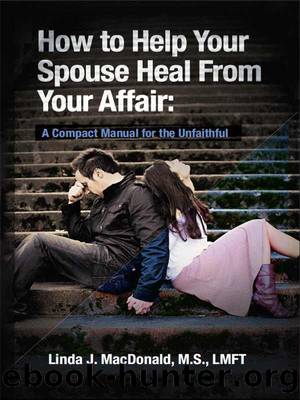How to Help Your Spouse Heal from Your Affair: A Compact Manual for the Unfaithful by Linda MacDonald

Author:Linda MacDonald [MacDonald, Linda]
Language: eng
Format: mobi
Publisher: Healing Counsel Press
Published: 2011-05-04T00:00:00+00:00
Helpful statements Successful Rebuilders use:
âI was wrong.â
âI deeply regret hurting you this way.â
âI have sinned against you and against God.â
âIf I could do things over, I never would have become involved with _____â
These statements need to be accompanied by sincere feelings of remorse for the offense and its damage, not simply regret for being âcaught.â
Hurt spouses canât hear enough sincere, specific apologies. Successful Rebuilders accept this assignment, knowing that the faithful spouseâs need for apologies related to the affair will diminish over time. This usually takes years, not weeks.
After many apologies and evidence of behavior change, the betrayer can eventually say, âI hope someday you will forgive me for _______ (a specific hurt or offense)â An example might be, âI was so wrong. Will you forgive me for running to __(the lover) for comfort instead of to you or to God?â âWill you forgive me for saying _______ to you? I feel terrible for saying that.â
The betrayed spouse may not be able to forgive just yet. But it still helps for him or her to know the strayer desires to be forgiven, without undue pressure to do so on demand.
Other family members need heartfelt apologies too. Your parents-in-laws will eventually need you to apologize to them for betraying their trust and deeply wounding their son or daughter. However, your in-laws may not be receptive to your apologies unless your spouse is showing the beginning signs of healing. They will take their cues from their grown kid. [For insights regarding apologies to your own children, see chapter 10.]
Strayers who find themselves unable to conjure up feelings of remorse, may need to seek help from God. The temporary thrill of intimate betrayal and the accompanying rationalizations tend to cloud betrayersâ judgment and harden their hearts toward God and loved ones. Deceitful pleasures also block a personâs ability to feel appropriate sorrow for their offenses.
A strong dose of truth may provide just the right medicine to jolt a dazed betrayer out of the stupor of emotional deception. If you find yourself detached and without adequate remorse for what youâve done, you might try reading Dr. Earl Wilsonâs book, Steering Clear [see Annotated Bibliography].
For those who value the Jewish and Christian scriptures, the first nine chapters of the Book of Proverbs can inject a new sense of reality about the nature of their unfaithful activities. Many betrayers also find help achieving genuine contrition through reading King Davidâs prayers of regret and hope after his affair with Bathsheba, as recorded in Psalm 32 and Psalm 51.
Download
This site does not store any files on its server. We only index and link to content provided by other sites. Please contact the content providers to delete copyright contents if any and email us, we'll remove relevant links or contents immediately.
Spare by Prince Harry The Duke of Sussex(5197)
Tuesdays with Morrie by Mitch Albom(4784)
For Baby's Sake(4571)
Machine Learning at Scale with H2O by Gregory Keys | David Whiting(4313)
Never by Ken Follett(3957)
The Five People You Meet in Heaven by Mitch Albom(3569)
Fairy Tale by Stephen King(3399)
Reminders of Him: A Novel by Colleen Hoover(3117)
Will by Will Smith(2920)
Tuesdays With Morrie by Mitch Albom(2762)
The Clitoral Truth: The Secret World at Your Fingertips by Rebecca Chalker(2720)
Borders by unknow(2315)
Friends, Lovers, and the Big Terrible Thing by Matthew Perry(2230)
The Body Keeps the Score by Bessel van der Kolk MD(2217)
Cruel to Be Kind by Cathy Glass(2205)
The Stranger in the Lifeboat by Mitch Albom(2121)
Love on the Brain by Ali Hazelwood(2078)
Finding Chika by Mitch Albom(1968)
New Morning Mercies: A Daily Gospel Devotional by Paul David Tripp(1919)
